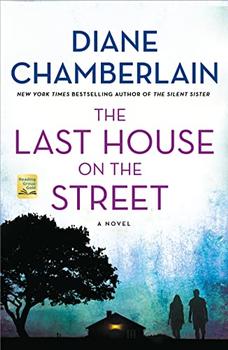Book Club Discussion Questions
In a book club? Subscribe to our Book Club Newsletter!
For supplemental discussion material see our Beyond the Book article, The SCOPE Project and our BookBrowse Review of The Last House on the Street.
Please be aware that this discussion guide will contain spoilers!
- The novel alternates between Ellie's perspective in 1965 and Kayla's perspective in 2010. How did the alternating timelines and voices impact your reading experience? Was there one perspective that you connected with more than the other?
- In chapter 2, Ellie says "There are moments in life when you suddenly see your future and it's not at all what you expected." That statement resonates with the rest of Ellie's life. Can you describe a situation where this statement resonated with you?
- The Last House on the Street touches upon several national current events in each timeline, for example: LBJ passing the Voting Rights Act in the 1965 timeline and the presidency of Barack Obama in 2010. How did reflecting upon the events in each timeline influence your reading experience?
- Kayla and Ellie both suffer the loss of the man they love. How does this impact each of them? How does this influence the relationship they're able to create?
- For both characters, their house represents their grief. For Ellie, her house is a reminder of her tragic loss and familial betrayal. For Kayla, her house is a constant reminder of the loss of her husband and the life they could have shared there. What is the significance of what happens to each house at the end of the novel? What does it mean for the future of both characters?
- What significance does the Hockley house have in the town of Round Hill? What does it represent in each timeline?
- What significance does Kayla's house and all of the Shadow Ridge development mean to the town of Round Hill?
- How did you feel after you learned of Brenda and Miss Pat's involvement in Winston's death? How do you imagine Ellie felt?
- What role does guilt play in the narrative? Who do you believe feels the most guilt?
- In chapter 21, Kayla finds a letter that her father, Reed, wrote to Jackson, describing their new house as "haunted." Discuss what that means in the context of this story. What is the house haunted by, if not supernatural beings?
- In what ways does the society that the characters were born into impact who they become? In what ways does it not impact them? For example, both Brenda and Ellie were raised in the same society, but had very different values and, consequently, led very different lives. Why do you think Brenda and Ellie had such different views on race? What is the importance of society and "fitting in" for the characters in the 1965 timeline? How does it influence the plot?
- What is the impact of Winston and Ellie falling in love despite Winston's statement that he never "planned on falling in love with a white girl" in chapter 42? How would the story be different if they were just friends?
- Discuss the effect of bias in the SCOPE program. For example, Reverend Filburn and the Northern students did not initially welcome Ellie because she was from the South, and the people in Round Hill opposed the SCOPE program because "Yankee" outsiders were coming in to "tell us how we should be runnin' things," as Buddy says in chapter 6.
- Ellie frequently leads her fellow SCOPE volunteers and supporters in song during protests. Winston also sings a few verses from "I'll Fly Away" to Ellie on the first night they meet in the tree house on page 277. What is the role of music for the civil rights activists?
- At the end, in chapter 52, Ellie admits that she and Reed may have ended up together in another lifetime. What do you think is the meaning behind this statement? Do you believe this could have been true? Why or why not?
- Discuss the definition of "family" in the novel. What are the expectations of family, and where do the lines blur between blood relatives and people who simply fulfill familial roles? Which is more important to the Hockley family?
- "Loneliness felt like a disease with no cure," Ellie says in chapter 40. Which characters do you think are most impacted by loneliness? Is Ellie lonely in California? Is Brenda lonely in Round Hill despite being surrounded by the people she grew up with? Has this statement ever rung true in your life?
- How does the idea of marriage play into Ellie's idea to wait until marriage to "be intimate" with a man? Were you surprised when she and Winston did so in the tree house? What is the significance of that decision?
- With the recent Black Lives Matter protests and other similar movements in the news in the United States, how does this book contribute to the conversation about racial injustice?
- How do the idea and perception of protest differ in 1965 to the present day?
Unless otherwise stated, this discussion guide is reprinted with the permission of St. Martin's Griffin.
Any page references refer to a USA edition of the book, usually the trade paperback version, and may vary in other editions.
